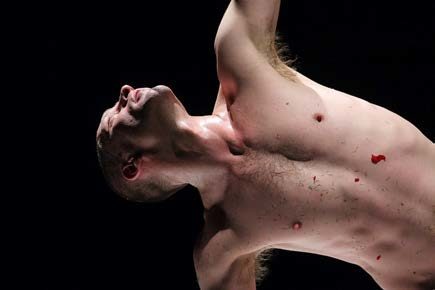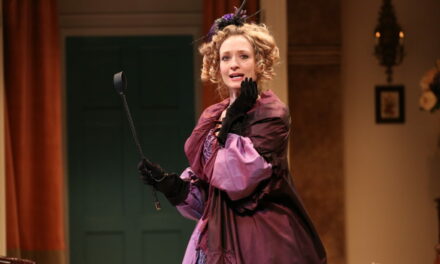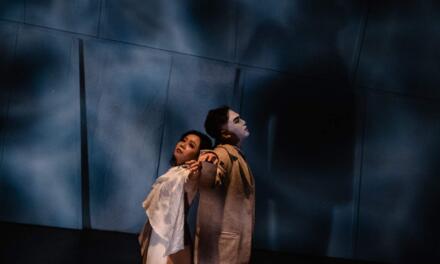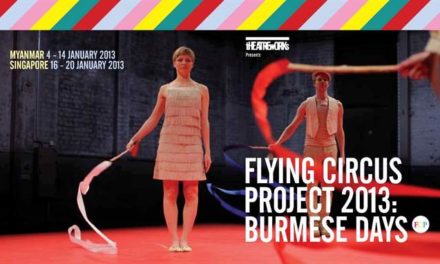What is a classical approach for you?
Thinking. Position. Discipline in my daily routine, discipline in life.
Does a classical approach still determine your daily discipline, your discipline in life?
I would really like it to be that way, but it’s hard to attain.
And if you had the opportunity would you go to ballet classes every day at ten a.m., like dancers in a ballet company?
Yes, absolutely. My technique prevents comparison with other dancers, but I would find somewhere out of the way, I would stand next to the bar and would do all of the exercises. They require great effort and concentration. You do them in a group, but in fact, you’re all alone when you do such exercises. In his daily ballet class, a dancer is able to see how his disintegrating body is nonetheless able to function. It’s a test that he presents himself with every day. At a certain age, you take lessons in classical ballet not in order to learn something and perfect your technique. Every dancer, even after retiring, should go to a ballet studio every day. Just like an old woman who goes to church for a few minutes every day in order to be able to have the strength to face the sadness of old age. It’s easier for her then. It gives her a certain sense of security And it allows her to maintain some daily discipline. The exercises which I do every day help me to function with all of my injuries and physical problems. But they are only exercises, it is not the prayer-like exercise of classic ballet. Quite frankly I stopped practicing. It’s religion without practice.
So you are a non-practicing believer?
Yes. But because I no longer practice, love has disappeared.
And what, for you, is a classical approach in the work of a choreographer?
First of all, I make an outline, I sketch it out with the help of battement tendu, plié, jeté, adagio, grand battement. Then I take my paintbrush and begin to paint, using my own colors. And my dance is certainly not classical, it reflects what remained from my classical training.
Is classical dance your language?
Yes.
And do you create neologisms?
I don’t think about it. Six years ago, while dancing at the Wielki Theater in Poznań, I injured myself and thought I would never dance again. Asia Leśnierowska prompted me to keep working the fear out of myself which had begun to overpower me. At that point it hadn’t occurred to me to create a performance, I just wanted to invite my friends in order to say goodbye to them, in order to tell them how difficult life had become for me because I would never perform on stage again. It was meant to be a single show, untitled, with free entrance. I only wanted every member of the audience to give me their face, to allow themselves to be photographed en face and in profile. It was meant to be an exchange between us. And then I decided to dance naked this is my Lord’s Prayer in ballet exercises. Classical ballet class, exercise after exercise. I wanted to expose myself, to strip away this sacredness, and simultaneously confer a different dimension upon it. Some people began to view me as an explorer, others as a murderer of that which is sacred for dancers. It was a desecration of the dancer’s bar. I came out onto the stage and laid bare the liturgy of dance. I did this so that I could show every twitching muscle of my body. So that people could concentrate not on the dance as a whole, but rather on the parts of my body, on the uncontrollable twitching of my knee. The viewer can focus on one element, an element that is not aesthetic.
Did anyone feel offended?
Some of my friends from the theater. I heard them say: why did you do this classical dance naked?
Was it intentionally iconoclastic?
No, it was only my friends watching me, after all. I wanted to be as defenseless as possible.
And then what happened?
The next day I went to Krakow. Doctors did not allow me to return to the theater, and Sławomir Pietras, the director, was not able to extend my contract. After my return from my six-month sick leave, I received a certificate that I was incapable of working. Then followed eight months of depression, hysteria, and a feeling that my life was over. It didn’t occur to me to perform Waiting, because it wasn’t a show. But the telephone rang: come, people want to see it. I came, I performed it, and then I went to Wałbrzych, Opole, Lublin, Poznań, Sofia, Bruges, Lille, Kaunas.
When did you begin to treat Waiting as a dance show?
Never.
So it’s not a show?
It’s a documentary piece.
Is it performance art?
Performance art occurs only once. This was performance art that began to live the life of a choreographed show. But it will always remain performance art.
And had you always planned, from the beginning, for your second solo appearance, I Want To Watch The World With You, to be a choreographed show?
No, it also arose as a performance piece, at the Rose Festival in Kutno. The idea arose out of pain and rebellion when my dog abandoned me. Lolka didn’t want to live anymore in so many hovels, in the dark rooms of an actor’s home, or in hotels, spending whole days in a rehearsal room or lying between the rows of seats in an auditorium. She didn’t want to get into my car with me; she ran away and lived with my friend who lives near the sea. That’s when I began to think for the first time about how sad her life was without a place of her own where she could have her own blanket and bowl. It had seemed to me that I’d been giving her everything, but it turned out that they were only substitutes. And I Want To Watch The World With You came into being. Because she didn’t want to watch the world with me. Now, three years later, she has returned to me… and there is no longer a wounded dog inside me now. But this happened, and the show remained.
I Want To Watch The World With You is the second part of your Triptych, which consists of three solo shows realized within the past six years: Waiting, I Want To Watch The World With You and Plaisir D’Amour, which premiered in October of last year. That is when you presented these shows as Triptych for the first time. Anna Królica wrote that your Triptych is a road that takes you away from dance, through theater, and then back to dance again. I Want To Watch The World With You is, for her, more of a theatrical show, while the rest are dance shows.
The entire first sequence which takes place within squares of light is, above all, physical – it’s dance, it’s the concept of movement. I divided this show into short monodramas, in which I alternately dance, sing, listen and speak. Each of these is a complete whole. But I Want To Watch The World With You is the only part of Triptych in which I speak. This show is like a larghetto in a three-part musical form: the first part fast, the third part fast, the second sad.
Do they differ from each other qualitatively?
Yes.
For me, the third part is qualitatively different from the others. It has a different structure, it creates space in a different way, a different kind of communication with the viewer emerges. The first two shows are self-contained within a very definite form, planned geometrically within a plane of movement and space, to a great extent as a result of lighting. And in the third part, there’s a kind of opening up, some air.
Plaisir D’Amour is a show about my normalcy. It’s exactly how my day looks. My exercise balls are on the stage. The show contains the set of exercises to which I devote two hours of every day in order to bring myself back to a state of basic functioning. Miraculous nails that take away my pain, and which put me on my feet again. They replace alcohol, which previously anesthetized me and pushed all of my troubles to the side so that they were no longer inside me. The space is the same as the space in the first two shows. Only the lights do not form an enclosure, and I am not boxed in. These situations are closed, problematic situations which I had to pit myself against. Not by fighting against them, but by telling people about them. The third part is a response to the first two parts. I found an asylum for myself, and I share this asylum with the audience. In Plaisir D’Amour, for the first time in a very long time, I perform huge leaps. I was afraid that perhaps my old injury, from six years ago, would return, but I was determined to do it – I was ready for whatever was going to happen. If the injury returned it would also be some kind of response. I wanted to escape these confines of mine, these squares that I had created for myself, in order to have contact with people. The fact that I am so expansive and invasive stems from the fear that I feel in front of people. I felt that I could finally allow myself to breathe.
And you share with us a small, intimate world of daily activities.
The first parts also describe my intimate world, but with the difference that they focus on concrete situations and problems. They are, in a certain sense, universal: somebody has left somebody, somebody has been fired from their job and has become unnecessary. And in the third part, I look at myself today, enriched by those previous experiences. Triptych came into being over the course of several years, during a time in which my orderly lifestyle was turned inside-out. These shows were a kind of self-therapy, and the third part is not only self-therapy but also medicine which I prescribed myself. I share this with people, I tell them about what I do.
And why is there a red-and-white flag in the show? A Polish flag made out of a pair of white underwear and a red undershirt turned upside down. And a folk band from the Joy Seniors’ Club in Łowicz appears in your projected visuals, dressed in folk costumes.
It’s a reference to the place where I live. Nowadays children are learning how to live and function everywhere and in all types of conditions, and my message is as follows: I am able to and want to live only here. There are no important, manic national subtexts here.
And would you agree to perform Plaisir D’Amour as a separate show if somebody asked you to?
Probably not. I haven’t seen this show. I don’t have any photos of Triptych, which I performed only once, I don’t have any recordings of it. I know the structure, the skeleton, of Plaisir D’Amour, but I don’t know how this show functions visually and emotionally. I haven’t been able to see it, to touch it. When it all ended, most of all I was amazed that I’d been able to survive it physically. Everything was beyond me in terms of technique, and so the next shock for me was that everything was technically successful. I wasn’t even capable of analyzing what had happened. Happy, thrilled that it had turned out well, but also a bit sad because I hadn’t been able to consciously experience it. I didn’t put Triptych to rest in the same way that I usually put to rest shows that I’m not involved in, at the moment of their premieres. Neither did I put it aside in the way I put aside shows that I am involved in, where I function normally. I don’t remember anything. I passed through this performance as if I was in a psychedelic frenzy.
Did you bring some kind of phase to an end with Triptych?
Yes, I think so.
And did you begin a new one?
No. Triptych castrated me.
Will anything change when you perform it again at the Warsaw Theater Meetings?
I don’t know. After such a long time, since October, it will feel like I’ve prepared a premiere all over again. I’ll be afraid that I won’t be able to manage it physically. I’m now half a year older, and once again I have to do this same incredibly long, physically exhausting show. And will all of the techniques work?
Will you continue to dance solo?
I think so. I have the impression that when I’m alone on a stage, and I’m telling about myself then I can reach people better, I enter into an intimate dialogue with each of them individually. I’m also responsible for everything myself, from beginning to end. Wanting to create a show about my own heart and my own impotence, I have to do it entirely alone. I have to let go of this problem through myself, by going out onto the stage alone. I must map out my entire path on the stage for myself, write it down, design the lighting, the decorations, sometimes costumes. I can’t rely on others for support, because then they would create the show for me.
Is it a conceptual dance?
A concept is a pigeon-hole that I don’t want to be trapped in.
You react very strongly against this pigeon-hole.
Yes, and sometimes it takes peculiar forms. Sometimes I devote more energy to defending myself from being pigeon-holed than from allowing myself to enter the pigeon-hole. They constantly try to force me into the conceptual dance slot. I haven’t given in. In these shows, there is a concept, but auteur theater is always conceptual. However, in addition to an idea, the artist must also have technique. Technique is his language. A person with technique has a base and a range of possibilities. A person lacking technique will be an actor, singer, or dancer with one role and one ability given by God. I know a lot of choreographers and dancers who do solo shows and for whom a concept is the most important, and dance is merely an addition. But a dancer is meant to dance, this is his language, he must act physically in order to create something of quality.
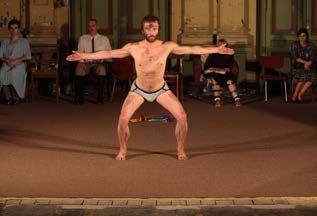
Mikołaj Mikołajczyk in The Evening Of The Orphans photo: Krzysztof Bieliński
Is there anyone whom you consider as a mentor?
Henryk Tomaszewski. I’ve had many teachers, but only one mentor. I know that I have less right to consider him a mentor than others who have stood by him for many years. But it was Tomaszewski who got me on my feet as a performer. My second mentor is Pina Bausch. But she never taught me in real life. In her case, everything happened between us in my mind.
And what have you received from your mentors?
Sensitivity. From both of them. Onstage sensitivity.
Tell me, please, about when you met Tomaszewski.
When I was a child I went to a ballet school in Poznań for three years. It was my mother’s dream, I didn’t like it. After three years I was kicked out of the school. I returned to Kutno, finished elementary school and then high school, during which I was interested in history. I spent entire days devouring numerous history books. I went to lectures at the Museum of Art in Łódź. I absorbed the knowledge of past eras. It entertained me, it allowed me to forget about the depressing daily reality of Communism. I created my own private world. I wanted to be a monument conservationist and art historian. I went to training camps, I worked at the Monument Conservation Workshop in Zamość, I took part in history and art history competitions. At that point I didn’t think about dance in rational categories, it was only a childhood memory– or, actually, a memory of its absence. But something must have hatched then in my mind, in my heart. Something still forced me to see myself on the stage, in reality and in my dreams. It kept pulling me back there cruelly. From my parents’ stories, I found out that I had been conceived on a mattress on the stage of the Railway Workers’ Culture Center in Kutno, where my mother worked. My father also worked for the railway. Kutno is a railway town; everybody there knows somebody who works for the railway. It’s a city of traveling, it’s a thoroughfare, all the people in that town are either headed somewhere or coming from somewhere. A fast change, a fastball, escape, and pursuit… that’s theater. The rattle of wheels stayed in me, it’s still in me even now, the rhythm of train trips, the whistle of steam engines, the broadcast speakers at the station – it’s perversely pleasant. I’ve always had the impression that something is about to happen, some train is finally going to be the one I’ve been waiting for. I used to do ballroom dancing at the Kutno Culture Center, and I was a member of the Od jutra Theater group. I developed myself artistically as much as was possible in Kutno. When I was in my last year of high school, the Wrocław Pantomime Theater came to Łódź with their show The Seven-Day King. It was a great celebration. I didn’t know of the Wrocław Pantomime Theater then, nor did I recognize the name Henryk Tomaszewski. Those were different times, pre-internet. In a backwater provincial town, there was no way to learn about things. Before the show, I went up to him and asked him if he would accept me into his group. I did this because of a bet that my friend made with me. My impertinence was outrageous since I didn’t have any skills at that time. Tomaszewski told me to go to the Polski Theater in Wrocław the following Monday and to remind him about myself, and I could audition for him.
What kind of impression did the show make on you?
While watching it I already envisioned myself onstage together with those actors. I had the feeling that I had received a green light from the master himself. I went to my audition in Wrocław and Tomaszewski accepted me into his theater group. I was stunned by the fact that suddenly I found myself there. I had no skills, and the specific movement of pantomime theater was very difficult for me. Tomaszewski’s actors were either dancers with classical training or graduates of pantomime studies. I was given tasks on stage that would not reveal that I didn’t know what I was doing, that wouldn’t allow me to compromise myself. And only a few weeks after being accepted into the theater group I appeared onstage for the first time, in the production of The Seven-Day King. Then there were other performances – The Prodigal Son, A Midsummer Night’s Dream. And during only one season of work with the Pantomime Theater I performed in 110 shows, both in Poland and abroad, in front of packed audiences. This is much more than what is usually performed by repertoire dance companies these days.
What was your cooperation with Tomaszewski like?
His theater was a temple. I haven’t experienced anything like it since. Every rehearsal was like a religious ritual. Never since then have I participated in rehearsals during which there was such silence, with everyone listening to the director so attentively. Tomaszewski spoke beautifully and elegantly, in language that was simple and clear but simultaneously very emotional and vivid. Listening to him was a wonderful experience. Everyone respected him very deeply and trusted him completely. It was real auteur theater. Every single rehearsal took place no matter what, nobody faked anything, we always rehearsed in costume, with sets, with all of the props.
But after only one season you left the Pantomime Theater.
I wanted to earn some qualifications and become a professional. It was a very rational decision: there was only one professional pantomime theater group in the world. And I thought that when the leader was gone, there wouldn’t be anything for me to do. I wouldn’t develop further, because nobody needed these skills. I didn’t want to play it safe, I wanted to learn. I think I made the right choice because if I had stayed in an auteur theater for a long time I would never have been able to fit in anywhere else. A teacher of classical dance in pantomime told me that I was in good enough shape to dance. First I went to the Wielki Theatre in Łódź where one of Tomaszewski’s actors worked as a soloist. I was told there that my skills weren’t very high, and that I should audition for the Polish Dance Theater because there was a school connected to the theater where I could develop my dancing skills. I had an audition with Ewa Wycichowska and it was the greatest disgrace of my entire life. I stood at the bar and realized that as a dancer I completely lacked skills. The daily 45-minute dance class at the Pantomime Theater was treated simply as a warmup and didn’t serve to improve dancing skills. I remember that the dancers in the dressing room where I got changed after my audition laughed at me rather ruthlessly. But Ewa Wycichowska accepted me into the Polish Dance Theater, and Liliana Kowalska, who was the ballet mistress there and also the director of the ballet school, accepted me as a student. And for three years I studied at the ballet school while also dancing in the Polish Dance Theater. Ewa Wycichowska initially gave me two years to prepare myself for the stage, but already after only three months, she cast me in Borodin’s Polovtsian Dances. After four months there were two more shows, and after a year I was given my first major role, a solo part in which I had to dance as Wycichowska’s partner. Every role that I received was beyond my abilities. I had to fight, I had to live up to the hope that had been placed in me. After three years I received a diploma from the ballet school and became a dancer of the corps de ballet, then a coryphée and a soloist. I danced in the Polish Dance Theater for another two years, and I eventually had the feeling that I had achieved everything that was possible there. I was no longer developing my skills. So once again I was unfaithful and escaped. The immediate reason was that Ewa Wycichowska decided to perform a show for children, Child of the Sun. We had always danced in shows that were about essential things, about love and death, and now I was expected to be a bird, a flamingo. I decided that if I had to dance in a fairy tale, it had to be at a higher level: Swan Lake, Giselle. I was accepted into the Wielki Theatre in Poznań ballet company, and the very next day after I was accepted I was given the role of the messenger in the fairy tale show Dwarves, Dwarves.
How did you feel within the hierarchical structure of a ballet company?
The whole time I kept teaching myself and kept feeling an absence. I was always inferior in terms of technique, and because of this, I felt that I had to train constantly. Doing exercises gave me a chance to catch up, so I spent many hours every day in the ballet studio. In fact, the hierarchy, with its successive rungs, was confirmation that I was making progress. And after a few years at the Wielki Theatre, I wanted to find out what it was like to work in the West, so I went to Karlsruhe, where I went from being a soloist to an average dancer. Over thirty dancers from all over the world worked there, among which there was only one German. Nobody shouted at anyone, everyone worked on themselves, there was a completely different mentality. Very different than in Poland. There was no sense of danger. If a dancer wasn’t good enough, they simply weren’t offered a contract for the following
season.
Your career path from pantomime through dance theater to classical ballet is very unusual.
The order is usually like this: ballet school, ballet, contemporary dance, and then experimental auteur theater.
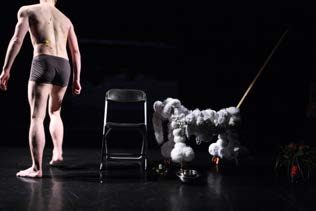
Mikołaj Mikołajczyk I Want To Watch The World With You Photo: Jakub Wittchen
In what way have you been shaped by this backward career path?
I had to start not with stretching or breaking my joints, but with my head.
What does it mean that the dance comes out through a dancer’s head?
You learn to talk as a child, and later you talk instinctively. But when you learn a foreign language as an adult, you have to analyze everything. When you learn classical dance as a child, you don’t wonder why a pirouette has to go in this direction, not a different one, and why the first position looks the way it does, and not differently, and what muscles are then used. I had to think about this and learn it, at the beginning in order not to harm myself, and later in order to learn my parts. Even after I had obtained my diploma, I had to prepare the same elements of every role from scratch, from the beginning. I had to learn all over again the same pirouettes for every new role. It was the same with all of the arrangements, the exits from the stage. I spent hours in the ballet studio learning how to execute specific elements of specific configurations. The preparation for every role was a twofold process for me – it was as if I had to build up technique for a given role. It was my private process.
Was the path from pantomime, through dance theater to classical ballet a formative experience for you in an aesthetic sense?
Yes, very much so. I’ve never had time to learn specific techniques thoroughly, I’ve always had shortcomings, and thus I had to treat every technique selectively in a certain sense, and had to adapt them to my physical abilities, and later also to my artistic capabilities. To let it pass through me. And through this opportunity of working with the ballet company of the Wielki Theater I learned to love opera, too, which I hadn’t known previously. After my evening rehearsals, I got up onto the stage and learned opera from the wings. Later I began to watch performances from the audience’s perspective. Now opera appeals to me more than classical ballet.
And dramatic theater? For many years you have worked as a choreographer in dramatic productions.
Contemporary dramatic theater appeals to me not because of language, but because of its rich emotionalism. It’s because of this that I’m able to fit into it well. In theatrical productions, I not only arrange formal scenes but above all, I create scenes that open the actors up and allow them to seek their own means of expression through movement. The theatrical choreography that I create is for the particular actors who work with me in a show. Actors often try to find “hooks”–movements and gestures which help them in their roles, and which become arranged alongside specific sentences and words. This sometimes makes it easier for them to learn a long monologue. This gesture or movement always remains in the same place and thus becomes artificial. It is also sometimes over-aestheticized. And movement should arise from emotion. Often my task is to remove movements and gestures, despite having sometimes added an hour’s worth of choreography to a show.
As a director, what are you searching for in theater, and what do you manage to find there? At the Jan Kochanowski Theater in Opole, you prepared a show based on Pasolini.
I’m not able to express everything by myself in solo dance shows. And it’s not possible to express everything through
dance, either. I know what words mean to me, and sometimes they are absolutely necessary. Sometimes they are no less important than the dance. It seems to me that I’m always able to find a language that allows me to join these worlds.
What is your work method? Do you encourage actors to find psychological motivation for their roles?
When we worked together on Pasolini, I forced a specific world upon the actors in advance, which I delineated very distinctly. We searched for the meanings of words not through psychological analysis, but only by exploring certain emotional states or tensions. The music of Giya Kancheli helped in this.
What happened with them between one climax and the next?
They waited. These emotional states were not generated, they were previously prepared and the actors entered into them immediately, and completely. The difficulty for them was that they were on the stage for the whole performance. In full readiness, like professional athletes before a race waiting for the gunshot, for the announcement: now.
But the music in the show always determines the phrasing of the words that are spoken. You created an opera.
Yes, perhaps. A spoken opera in which an actor must not only sing, extract sounds from himself, express a text, situate himself within musical phrases, but also express a given text and a given situation with full emotion. It’s a very affected form, requiring great precision. The audience allowed themselves to be pulled into this cold, distant, artificial, hermetic world. The viewers were not looking for reality on stage Through this operatic-theatrical artificiality, this text resonating with emotion and hysterical movement, they had to find this truth within themselves. Each actor was an epicenter, and apart from all of the scripted “hooks” he had to create his own rhythm for his character. I presented them with a huge challenge, but we were able to do it without “taking any shortcuts.” And this is what interests me in theater. I would like to develop my own unique language not for seeking truth on the stage, but for pure truth in the contact between the performer and the viewer. But perhaps I don’t believe in truth on stage, just truth in communication.
This has been your only theatrical production so far. But you have also considered staging Nights And Days.
Barbara Niechcic…
“…c’est moi?”
Sort of. Because I receive a lot of positive energy from outside, and I don’t know how to consume it all. I don’t know how to consume my own professional success, nor even small, everyday successes. I am constantly dreaming of water lilies. Not long ago my former boyfriend, in anger, as a farewell to me, danced my solos, my typical choreographed steps, and he told me that it’s impossible to live with a person like me because I’m always waiting for something or someone, I’m distant, not present in the here and now, always lacking something in present reality.
Do you think this description fits you?
I don’t know. I just took it as a commentary on my work.
You returned to operatic theater as a choreographer and as a dancer in Between, directed by Maja Kleczewska at the National Opera. In this show, you danced in a group for the first time in a very long time.
It was my first time creating choreography for an opera since my accident. My first large-scale ballet production. I didn’t know if it would be a pleasant experience for me or not.
And was it?
It was. I had to adapt my tastes to those of the director, and vice versa. And I have a different “culinary” sensitivity than Maja Kleczewska. Maja likes spicier dishes, while I am satisfied with milder delicacies. But despite this, we collaborated with each other very well. During Between, additional stress was caused by the fact that for the first time in many years I had to be on stage with other dancers, and apart from indulging my own perspectives, I had to indulge others’ as well. This was the most difficult thing for me. And some pre-show hysteria also returned. Not as intense as before, but I became a bit infected by the collective stage fright.
And can you imagine yourself dancing now to somebody else’s choreography? Would you accept such an offer? You haven’t done this since you worked in the Wielki Theatre in Poznań, have you?
I’ve thought about that many times, and my first reflex has been to think that I would accept such a proposition. But when I’ve tried to imagine a concrete person, a concrete room, and concrete choreography, I realized that I couldn’t picture myself in such a situation.
Why not?
I don’t know, maybe it’s guardedness, fear. There are many things which I can no longer do. When I dance to my own choreography, I can change it at any moment, if some kind of injury pops up. And in carrying out the vision of another choreographer, I would be under additional stress, which I don’t want to have. Recently I received a very interesting and twisted assignment – I have to take part in a production in which another choreographer will work with the dance group, the soloists, and the choir, while I’ll be present at all times on the stage, creating a separate world for myself. Working against the other choreographer.
For Plaisir D’Amour you invited the “Joy” Seniors’ Club in Łowicz to collaborate with you. In the summer you are going to lead workshops that culminate in a performance involving senior citizens, within the framework of the project Wielkopolska: Revolutions. What kind of experience does such work constitute for you?
I already had a similar experience when working on The Seagull with Maja Kleczewska, when we invited some older people to take part in the performance. It’s different to work with professionals, from which one can and must demand things than with ordinary people, who give you everything because, quite frankly, you can’t force anything out of them. You receive an assignment and you must realize it within the production, and somebody really gives you something, and it’s a huge challenge. I’m afraid that I might cheat them, only because our expectations are going to be completely different. I can do this unconsciously. I’m afraid that the scene I’m going to do will seem to them like manipulation, because they’re not actors or dancers, and I might lack the right words to use with them. Some women came from Łowicz to the premiere of Triptych. They sat down in the first row, in their work clothes, with scarves typical of the town of Łowicz. Before the filming began I told them what the show was about and that I would perform naked, and I asked them to sing a song. But nonetheless, I was afraid that they could feel cheated. On Youtube, there’s a film on Triptych in which Hania Bieguszewska says, before she comments on the show, that I’m honest. I had never previously regarded myself in such categories. One immediately feels the responsibility and strength of that word.
This article was originally published in Didaskalia in 2012 and has been reposted with permission.
This post was written by the author in their personal capacity.The opinions expressed in this article are the author’s own and do not reflect the view of The Theatre Times, their staff or collaborators.
This post was written by Marta Michalak.
The views expressed here belong to the author and do not necessarily reflect our views and opinions.

